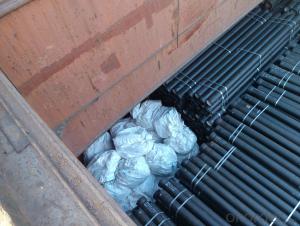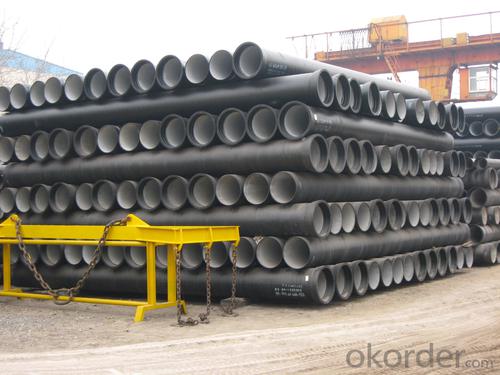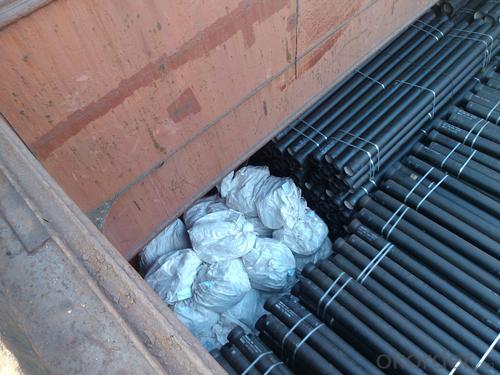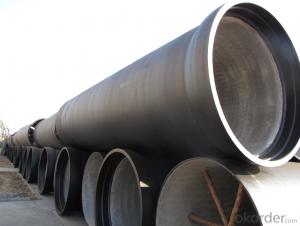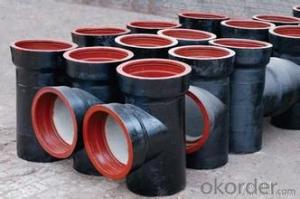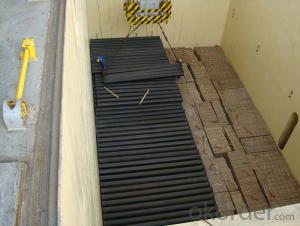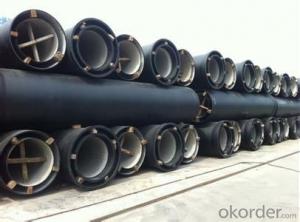DUCTILE IRON PIPE DN1000 K9
- Loading Port:
- China Main Port
- Payment Terms:
- TT OR LC
- Min Order Qty:
- -
- Supply Capability:
- -
OKorder Service Pledge
OKorder Financial Service
You Might Also Like
Specification:
1) The standard of pipe: ISO2531:1998, K9
2) Effective length: 6m
3) Inner cement line: Portland cement line as per ISO4179
4) Zinc coating: at least 130g/m2 as per ISO8179
5) Bitumen painting: at least 70um as per ISO8179
6) With 100% quantity of NBR ring, or SBR ring, or EPDM ring as per ISO4633
7) DN80mm-800mm
8) High strength, lighter than grey iron, good corrosion resistance, no furring, small flow resistance, easy fixing, long life tome about 100 yeas
9) Produced by Hangzhou chunfeng machine
10) Checked by automatic inspection equipment
11) Composition:
Chemical composition | | | | |||
Chemical composition | Ductile Cast Iron Pipe (%) | Grey iron pipe (%) | Steel pipe (%) | | | |
C | 3.5-4.0 | 3.2-3.8 | 0.1-0.2 | | | |
Si | 1.9-2.6 | 1.4-2.2 | 0.15-0.4 | | | |
Mn | 0.15-0.45 | 0.4-0.6 | 0.3-0.6 | | | |
P | ≤0.06 | ≤0.3 | 0.02-0.03 | | | |
S | ≤0.02 | ≤0.1 | 0.02-0.03 | | | |
Mg | 0.03-0.06 |
|
| | | |
12) Feature:
Mechanical properties | | | | |||
| Ductile Cast Iron Pipe | Grey Iron Pipe | Steel Pipe | | | |
Tensile Strength(Mpa) | ≥420 | 150-260 | ≥400 | | | |
Yield Strength(Mpa) | ≥300 | No Confirmation | No Confirmation | | | |
Bending Strength(Mpa) | ≥590 | 200-360 | ≥400 | | | |
Elongation (%) | ≥10 | Neglected | ≥18 | | | |
Brinell Hardness(HBS) | ≤230 | ≤230 | About 140 | | | |
13) T type mechanical joint
14) Packing: in bulk or container
- Q: Are ductile iron pipes suitable for installation in areas with high soil compaction and traffic loads?
- Yes, ductile iron pipes are suitable for installation in areas with high soil compaction and traffic loads. Ductile iron pipes have high tensile strength and are highly resistant to external loads, making them ideal for areas with heavy traffic and compacted soil. They are designed to withstand the pressure and stress caused by the movement of heavy vehicles and the weight of the soil above them. Additionally, ductile iron pipes have excellent flexibility, allowing them to absorb and distribute the load more effectively, reducing the risk of damage or failure. Therefore, they are a reliable choice for installation in areas with high soil compaction and traffic loads.
- Q: Can ductile iron pipes be used for trenchless installation methods?
- Yes, ductile iron pipes can be used for trenchless installation methods. Trenchless installation methods, such as horizontal directional drilling or pipe bursting, allow for the installation of pipes without the need for extensive excavation. Ductile iron pipes are known for their strength, durability, and flexibility, making them suitable for these trenchless methods. Additionally, ductile iron pipes have excellent resistance to corrosion and can withstand high-pressure conditions, further enhancing their suitability for trenchless installation.
- Q: How much is a ductile iron pipe dn400?
- High quality cast iron ductile iron pipe with low phosphorus and low sulfur iron making production of blast furnace, according to the current international advanced centrifugal casting, annealing process, water-cooled metal type centrifugal pipe casting machine casting, after annealing, socket dressing, pressure test, internal lining layer of cement, cement treated lining, water and health cement lining, outer wall coated with asphalt paint, asphalt paint baking, socket antirust processing, spray marks and other procedures for the packaging, with high strength, high elongation, corrosion resistance of a body strong as iron.
- Q: Some questions about the bearing capacity of nodular cast iron pipes!
- The minimum tensile strength of ductile iron is 400MPa, and the stresses can be calculated according to the wall thickness, diameter and safety factor.
- Q: The difference between spheroidal graphite cast iron pipe and HDPE water supply pipe
- As the HDPE pipe is made of hot melt connection, the construction is more difficult, and the installation cost is about 40% higher than that of the nodular cast iron pipe.
- Q: Are ductile iron pipes suitable for wastewater systems?
- Yes, ductile iron pipes are suitable for wastewater systems. Ductile iron is a strong and durable material that is resistant to corrosion and can withstand the harsh conditions often found in wastewater systems. It has a high tensile strength, which allows it to handle the pressure and stress caused by the flow of wastewater. Additionally, ductile iron pipes are easy to install and have a long lifespan, making them a cost-effective choice for wastewater systems. Overall, ductile iron pipes are a reliable and suitable option for carrying wastewater in various applications.
- Q: Are ductile iron pipes suitable for airport runway drainage?
- Yes, ductile iron pipes are suitable for airport runway drainage. Ductile iron pipes have excellent strength and durability, making them capable of withstanding heavy loads and extreme conditions, which are often encountered in airport operations. They are resistant to corrosion, which is crucial in a drainage system that may be exposed to various chemicals and environmental factors. Ductile iron pipes also have smooth inner surfaces, allowing for efficient flow of water and preventing blockages that could disrupt the drainage system. Additionally, they are easy to install and maintain, making them a reliable choice for airport runway drainage systems.
- Q: What is ductile iron?
- Ductile iron, after being treated with either magnesium or cerium, undergoes an improvement in its mechanical properties. This particular type of cast iron earns the name "ductile" due to its higher degree of ductility in comparison to other cast iron varieties. Ductility pertains to a material's capacity to stretch or deform without breaking. This quality renders ductile iron particularly ideal for applications that demand both high strength and resistance to wear and tear, such as pipes, automotive components, and machinery parts. The inclusion of magnesium or cerium during the manufacturing process aids in the formation of graphite within the iron's structure, contributing to its distinctive properties. This graphite formation serves to enhance the iron's flexibility and reduce its brittleness, enabling it to absorb shock and vibrations without fracturing. As a whole, ductile iron presents a fine balance between the strength of cast iron and the flexibility of steel, thereby establishing itself as a versatile material well-suited for diverse industrial applications.
- Q: Can ductile iron pipe be used for marine applications?
- Ductile iron pipe is suitable for marine applications due to its high strength, durability, and resistance to corrosion. This type of cast iron possesses properties that make it ideal for use in various marine environments, including those with saltwater. Marine applications commonly utilize ductile iron pipes for tasks such as seawater intake and outfall systems, offshore oil and gas platforms, submarine pipelines, and marine dredging projects. The corrosion-resistant nature of ductile iron protects against the harsh conditions found in marine environments, including corrosive saltwater, tidal currents, and marine organisms. Furthermore, ductile iron pipes have excellent mechanical properties, including high tensile strength and impact resistance, which further enhance their suitability for marine applications. In conclusion, ductile iron pipe is a reliable and cost-effective choice for a wide range of marine applications.
- Q: Do ductile iron pipes have inner enamel?
- If the market supply is indeed difficult, can be done by the owners, Design Institute of supplier relationship; if the design institute requires it to provide products can persist in wilfully and arbitrarily, the available information (if the market can not supply, design a hair ah).
Send your message to us
DUCTILE IRON PIPE DN1000 K9
- Loading Port:
- China Main Port
- Payment Terms:
- TT OR LC
- Min Order Qty:
- -
- Supply Capability:
- -
OKorder Service Pledge
OKorder Financial Service
Similar products
Hot products
Hot Searches
Related keywords

